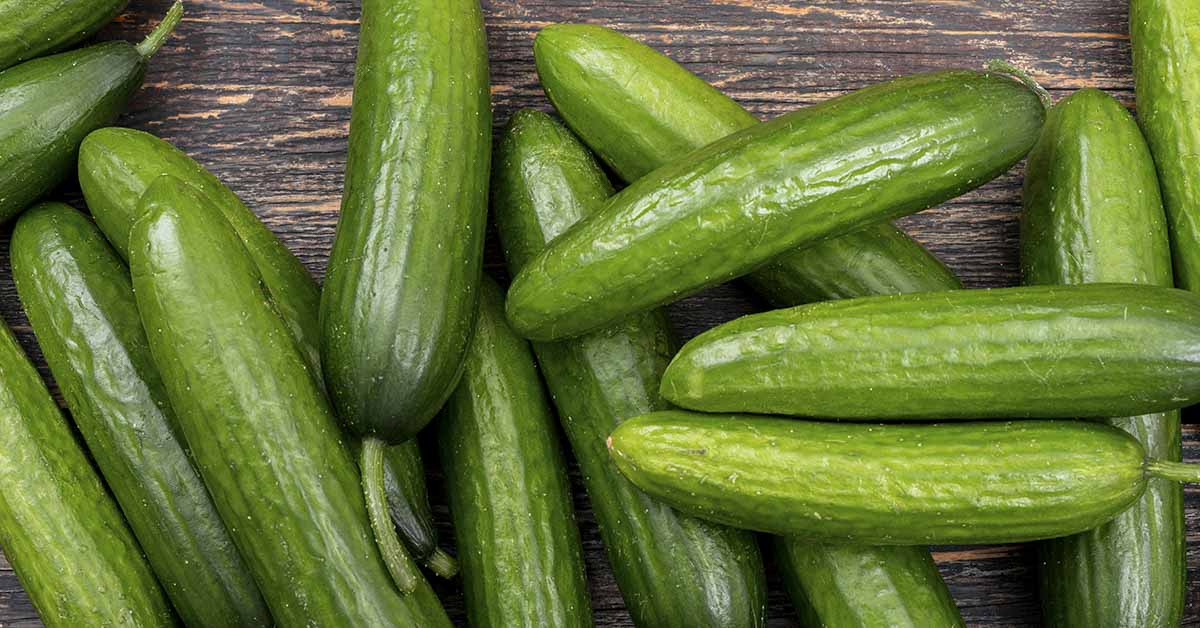Eating healthily can become fairly costly. As such, it’s frustrating when fresh fruits and vegetables go bad within days of buying them. However, properly storing food can help to prolong shelf life, minimizing waste. Although all fruits and vegetables produce and are ripened by ethylene, some produce high amounts, while others are highly sensitive to it. Understanding that, as well as which thrive at which temperatures, can help keep food optimal and fresh for longer. Furthermore, isolating produce during storage is a safe way to help it thrive because it can be hard to remember how ethylene affects each family of fruits and vegetables.
Storing Food and Considering Ethylene
Foods that are sensitive to ethylene should be isolated to avoid exposure that may speed up the rotting process.
1. Lonely Cucumbers
Cucumbers are among the most simplistic yet versatile foods out there. Primarily water, they’re excellent for a boost in hydration, but they’re also high in Vitamin K, potassium, and magnesium. They can be sliced and used for dipping, adding to salads, or sprinkled with your favorite seasonings. They’re botanically classified as a fruit but, for culinary purposes, classified as a vegetable. Cucumbers can even be used in beauty treatments or around the house. With so much flexibility, it’s clear that properly storing food can help minimize wasted money, food, and even certain resources. Cucumbers should be stored away from other fruits and vegetables because they’re incredibly sensitive to ethylene gas, produced by many common foods like strawberries, avocados, bananas, and potatoes. Ideally, they should be stored in temperatures around 55 degrees F to minimize mushy water spots. If refrigeration is required, it’s suggested that cucumbers be stored in a plastic bag to avoid exposure to ethylene gas from other fruits and vegetables. In contrast, at room temperature, it’s suggested to keep them in a perforated bag to ensure they get some aeration. When properly stored, cucumbers can stay fresh and crisp for up to 2 weeks.
2. Pumpkins, Onions, and Squash
Generally, all have a long shelf life but are highly sensitive to ethylene gas. Therefore, they, like cucumbers, keep well at temperatures of around 50-55 degrees F. Astonishingly, they can last 3-6 months, depending on their size. Larger lasts longer. Optimal storage occurs in a wicker basket to allow for aeration.
3. Cauliflower
Properly storing food like Cauliflower, Broccoli, Asparagus, and Brussels sprouts includes keeping them in isolation and a perforated bag in the fridge for maximum freshness. They can hold for around two weeks when correctly stored.
4. Storing Food Like Leafy Greens
Spinach, Kale, and Chard, like cucumbers and other foods on the list, are also highly sensitive to ethylene gas and should be kept in a container or plastic bag with a paper towel to absorb any excess moisture.
5. Bananas
Properly storing food like bananas can be tough because they ripen so quickly. One day they’re green, and before you know it, they’ve passed their prime. To avoid wasting them, separate the bananas from one another because they produce large amounts of ethylene gas. It is suggested that bananas will go much further if some can be stored on the counter while others are stored in the fridge, so they’ll ripen at different times.
Other Foods that produce large quantities of Ethylene:
Nearly every fruit and vegetable produces some level of ethylene. Therefore, almost all of them should be stored in a manner that allows them to aerate or breathe. However, because some foods produce higher amounts than others, it’s important to remember that few fruits and vegetables actually thrive in the company of others.
If you need something to ripen faster, storing it with one of these high-ethylene foods will be a great solution
- Figs
- Peaches
- Strawberries
- Apples
- Plums
- Grapes
- Melons
- Pears
- Peppers
- Tomatoes
- Celery
- Green Beans
- Broccoli
Indifference to Ethylene
6. Potatoes
Potatoes and other root vegetables, like beets, carrots, and parsnips, retain supplements from the soil and are nutritionally dense. They can be stored for 2-3 weeks and are best kept in dark, cool, and humid climates. For example, in the fridge in a brown paper bag.
7. Washing Berries
All produce should be washed to avoid ingesting pesticides or other harmful substances. However, berries shouldn’t be washed until right before they are consumed to minimize mold because moisture can get trapped inside mold spores. Additionally, to prevent mold growth, they are washed in a vinegar and water solution, one cup vinegar to three cups water.
8. Storing Food Like Mushrooms
Because they are great at picking up flavors, they can adversely absorb unpleasant odors such as spoiled foods or flavorful foods like leftover takeout. Therefore, mushrooms should be stored alone, in a paper bag. This will also help with other contaminants, such as bacteria.
9. Herbs and Roots
Keeping certain root vegetables, like carrots or beets, in a jar with some water can help preserve them for up to 2 weeks. Note that stems should always be pointed down. Most herbs can also be stored this way. On the other hand, basil thrives at room temperature rather than cold. The mirky water will need to be replaced every so often. But all in all, this will keep them fresh and crisp for 2-3 weeks. Additionally, asparagus, celery, or carrots can be kept in an airtight container with water to preserve freshness on-the-go snacks.
10. Tomatoes
In addition to prolonging shelf life, keeping tomatoes at room temperature can also help preserve the flavor.
11. Citrus
Keeping citrus on the counter shortens its shelf life down to a week. Alternatively, when kept in the fridge it can last up to a month.
Pairing the cost of healthy eating with all the versatility of cucumbers, and other produce, it’s advantageous to avoid wasting money and resources. The first step to doing so is to be well-versed in properly washing and storing food.
Keep Reading: The Shelf Life of 32 Foods in Your Pantry
Sources
- “How to Store Cucumbers. Food Network. May 24, 2023
- “Health Benefits of Cucumbers” Medical News Today. Megan Ware, RDN, L.D. June 14, 2023.
- “12 Fresh Foods You Should Never Store Together.” Healthy. Lisa Marie Conklin. June 4th, 2021.
- “20 Foods You Should Never Store Near Each Other.” Eat This. Kiersten Hickman. March 13, 2022.
- “Why You Should Never Store Onions with Potatoes—Plus, Other Fruits and Vegetables That Don’t Go Together.” Martha Stewart. Melissa Kravitz Hoeffner. August 5, 2022.
- “Keeping Cucumbers Fresh: Learn How to Store Cucumbers.” Gardening Know How. Darcy Larum.

